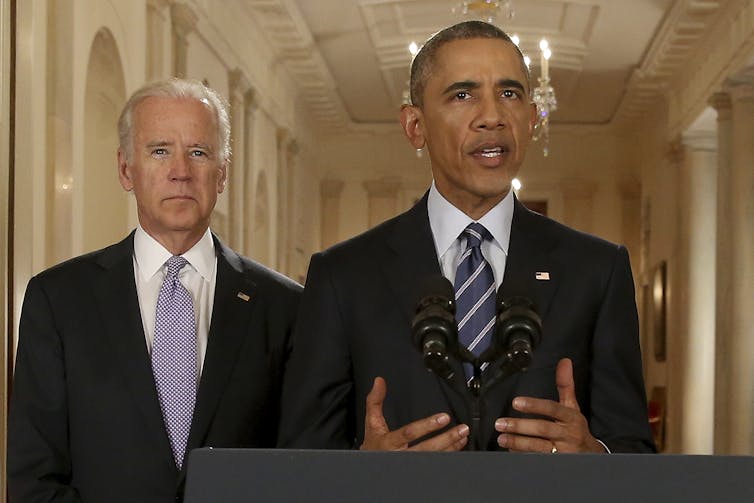Biden’s plan to revive Iran talks could calm the Middle East – but on Israel he and Trump largely agree
When the Taliban recently voiced its hope that Donald Trump would win a second term because he would withdraw U.S. troops from Afghanistan, it was a reminder that the 2020 U.S. election has big implications for the Middle East – and, by consequence, for American national security.
Foreign policy barely registers on Americans’ election agenda this year in a race dominated by the coronavirus pandemic, economic woes and structural racism.
Nonetheless, the United States’ global role is on the ballot in November. Trump has an “America First” vision in which narrowly defined U.S. interests rank as more important than helping maintain the global order. Biden, whose decades of foreign policy experience include chairing the Senate Foreign Relations Committee, wants to restore the United States’ international stature.
A Biden win would change American foreign policy significantly. But my research on U.S. policy in the Middle East suggests the United States’ actual engagement there might only show cosmetic changes.
Trump’s Mideast policy
Trump came to office promising to tame Iran, end the Islamic State and make “the deal of the century” between Israel and the Palestinians.
But he has executed no grand strategy in the Middle East.
Today Iran is emboldened, there’s no Israeli-Palestinian peace deal and, despite Trump’s claims, the Islamic State still exists. Trump withdrew the U.S. from a 2015 international agreement that restricted Iran’s nuclear program in exchange for lifting sanctions. But restoring sanctions has not curbed the Iranian government’s regional influence, much less forced regime change.
New sanctions just imposed on Iran’s banking system, for example, are mostly just making life harder for ordinary Iranians during a pandemic by reducing the value of the Iranian currency.
One consistency in Trump’s Middle East policy is Israel. Trump steadfastly supports its escalating opposition to Iran and aggressive policies in the Israeli-occupied West Bank and Gaza territories. Trump also departed from decades of settled U.S. policy on Israel’s capital, Jerusalem – a holy city for Muslims that the Palestinians likewise claim as their capital – by moving the U.S. embassy there from Tel Aviv. This shift angered Muslim nations across the Middle East and beyond, and effectively killed hopes of peace with Israel.
The Trump White House scored one diplomatic victory in the region by normalizing relations between Israel and two Arab nations, the United Arab Emirates and Bahrain.
In numbers, that matches what presidents Bill Clinton and Jimmy Carter together achieved in the Middle East: Carter normalized Israeli ties with Egypt and Clinton with Jordan. But without a just solution to Palestinian demands for statehood, critics say, genuine peace with Arabs is not possible.
Either way, Trump has unquestionably altered the geopolitics of the Middle East, pushing aside Israel-Palestine as the region’s main conflict. For both the U.S. and leading Arab nations, the priority is now stopping Iran from developing nuclear weapons and reducing Iranian attacks on American interests and allies.
Foreign policy barely registers on Americans’ election agenda this year in a race dominated by the coronavirus pandemic, economic woes and structural racism.
Nonetheless, the United States’ global role is on the ballot in November. Trump has an “America First” vision in which narrowly defined U.S. interests rank as more important than helping maintain the global order. Biden, whose decades of foreign policy experience include chairing the Senate Foreign Relations Committee, wants to restore the United States’ international stature.
A Biden win would change American foreign policy significantly. But my research on U.S. policy in the Middle East suggests the United States’ actual engagement there might only show cosmetic changes.
Trump’s Mideast policy
Trump came to office promising to tame Iran, end the Islamic State and make “the deal of the century” between Israel and the Palestinians.
But he has executed no grand strategy in the Middle East.
Today Iran is emboldened, there’s no Israeli-Palestinian peace deal and, despite Trump’s claims, the Islamic State still exists. Trump withdrew the U.S. from a 2015 international agreement that restricted Iran’s nuclear program in exchange for lifting sanctions. But restoring sanctions has not curbed the Iranian government’s regional influence, much less forced regime change.
New sanctions just imposed on Iran’s banking system, for example, are mostly just making life harder for ordinary Iranians during a pandemic by reducing the value of the Iranian currency.
One consistency in Trump’s Middle East policy is Israel. Trump steadfastly supports its escalating opposition to Iran and aggressive policies in the Israeli-occupied West Bank and Gaza territories. Trump also departed from decades of settled U.S. policy on Israel’s capital, Jerusalem – a holy city for Muslims that the Palestinians likewise claim as their capital – by moving the U.S. embassy there from Tel Aviv. This shift angered Muslim nations across the Middle East and beyond, and effectively killed hopes of peace with Israel.
The Trump White House scored one diplomatic victory in the region by normalizing relations between Israel and two Arab nations, the United Arab Emirates and Bahrain.
In numbers, that matches what presidents Bill Clinton and Jimmy Carter together achieved in the Middle East: Carter normalized Israeli ties with Egypt and Clinton with Jordan. But without a just solution to Palestinian demands for statehood, critics say, genuine peace with Arabs is not possible.
Either way, Trump has unquestionably altered the geopolitics of the Middle East, pushing aside Israel-Palestine as the region’s main conflict. For both the U.S. and leading Arab nations, the priority is now stopping Iran from developing nuclear weapons and reducing Iranian attacks on American interests and allies.




Comments
Post a Comment